Strictly Personal
Super Eagles and Marcus the pig at the World Cup
There has been nothing in recent memory like the build up to Nigeria’s first match at the on-going 2018 FIFA World Cup tournament in Russia. Football is Nigeria’s greatest unifier: when it is football, our compatriots drop all ethnic
Published
6 years agoon
There has been nothing in recent memory like the build up to Nigeria’s first match at the on-going 2018 FIFA World Cup tournament in Russia. Football is Nigeria’s greatest unifier: when it is football, our compatriots drop all ethnic, religious and ideological differences and profess the missing faith and ideology of one Nigeria.
They have expressed similar solidarity over whose jollof is sweeter in the competition between Ghanaian jollof, Senegalese jollof and Nigerian jollof – the way Nigerians defend our national cuisine, you would think we are a nation of gourmets, but nothing compares to the magic of football and its connection with nationalism. When it comes to football, Nigeria is the home of passion, zeal and boundary-less excitement. This is intriguing so to speak in the same nation where politics is combustible and a comment about another person’s faith or religion, or ethnicity or a mere disagreement between a Hausa-Fulani and a Yoruba at Mile 12 market, or between a pastoralist and a farmer in the Middle Belt could result in bloodbath, even at a football-viewing centre. The only explanation we have for this is that Nigeria is a complex country, full of paradoxes, and clearly, only Nigerians understand their country.
Nonetheless, the disappointing performance of the Super Eagles in their first match at the on-going 2018 World Cup tournament has nothing to do with paradox or complexity, it was a display of sheer absent-mindedness. In the build-up to the 2018 FIFA World Cup, Nigeria was the darling of the entire world. The news was that we had the best set of jerseys and kits in the world. Despite the shoulder-rubbing aspiration of Egypt, Croatia and one other country like that, the Nigerian jerseys designed by Nike became the aso ebi of the World Cup – a nice combination of colour, mood, shade and tint. The jerseys sold out a few minutes after being made available on the Nike website. Before you knew it, everybody that is somebody or simply pro-Nigerian started wearing the jersey, across the world. If the World Cup were to be won by the beauty of the garment, Nigerians would have seized the trophy even before the tournament began.
There was even a quarrel over the attires: there must be like four different types, but the one eventually designed by a local tailor made as much wave as the Nike ones and one guy went on twitter to protest that there was a Nigerian conspiracy against the Warri guy who designed the local aso ebi. At that point, the ethnic element came in, but Nigerians didn’t dwell on that. They quickly recognized @gt_stitches and asked the Super Eagles to show the world what they have.
Beautiful Nollywood girls and professional local slay queens pushed their frontal and back-end assets in our faces proclaiming Up-Nigeria. Some even exposed nice, succulent, tempting flesh, to reassure the Super Eagles that the women of Nigeria were behind them. Some celebrities joined the craze, including a few pot-bellied, and white-hair-in-the-nose actors wearing the Super Eagles jersey. The international media spotted the story – BBC, CNN, Al-Jazeera etc and adopted the Super Eagles as the best-dressed team in the World Cup and we all went wa-ah–oh. They even interviewed Russians watching our Nigerian football fans, dancing round the streets of Russia, singing, jolloficating, and energetically pounding the streets. “The Nigerians just won’t stop singing and dancing”!
The excitement was so much that even the President of Brazil endorsed Nigeria as a key team at the World Cup. The Irish, not having a team at the World Cup, ignored England and said they were supporting Nigeria. It was clear to me, doing a structuralist and semiotic reading of this that Nigeria is a country in desperate need of good news. I didn’t attempt a Marxist reading- the Russians themselves having killed Karl Marx after his death. The World Cup is not about the struggle of the masses, or equity or justice. It is war, even if at the end of the day the gifted are separated from the waka-pass and a dictatorship of the former is established. Every qualifying team joins the war to defend its country, its brand, national ego and corporate brand. Very sad. Very bad. So frustrating, therefore: The Super Eagles messed us up on Saturday, June 16. Many Nigerians were disappointed with their performance. It was Nigeria’s 6th World Cup appearance. The boys may have worn the most fashionable clothes, but they failed to realize that the World Cup is not a Dolce and Gabana show where Wizkid and Naomi Campell can exchange boy and woman banters or that the garment does not make the Monk. Every World Cup match is a macho game, a game of thrones, with too much at stake – personal brands, national brands, and the ego and emotions of nations. Our team lacked energy, drive and creativity. Alex Iwobi, the leading light from the qualifiers was anonymous on the left wing. Victor Moses was the man every Nigerian thought would make some difference. The fella was busy showboating all over the pitch on Saturday, falling up and down like a yoyo, kicking the ball like a headless chicken. Ighalo was left isolated with no secondary support.
Troost-Ekong certainly does not know that the World Cup field is not a night-club. He should be told to stop holding and embracing the opponent in the penalty yard. A football match is not a ballet where people cling to each other and do the pirouette. Mikel Obi should try and help his country. Cristiano Ronaldo had a big tax evasion matter on his head, but he still stood up for his country. Diego Costa: he proved himself for Spain. Lionel Messi may have lost the penalty: I blame the coach – never ask Messi to take the penalty, he would mess it up- but he worked hard for Argentina.
With an own goal and a silly penalty give-away in the match against Croatia, we have all now become a nation of football coaches. Young Nigerians who claim to understand football, even if their only claim to that is the Aba-made Super Eagles jersey they bought in Lagos Traffic, or at Yaba bend-down market, are now telling Gernot Rohr what combination he must adopt in subsequent matches. Many amateur coaches have recommended the 4-4-2 combination but I think Nigeria probably stands a chance of doing better in this World Cup if all the arm-chair coaches on social media can be blocked and all the fine girls with corruption-laden body parts can be banned from sending Direct Messages to the Super Eagles. Also, the boys must not visit Mikel Obi’s in-laws until the end of the tournament. They must stay away from Russian hospitality and Vodka. Nigeria as a country needs to concentrate on the task at hand. Switzerland was able to hold Brazil down to a 1-1 draw because they focused on the job. The same was the case in the Portugal-Spain match. Marcus, the pig had predicted that Spain would beat Portugal. But that didn’t happen. In the dying minutes, Ronaldo made it a hat-rick and cancelled Diego Costa’s brace. We need people like that in the Super Eagles. Portugal obviously did not rely on the pig.
It is indeed a crying shame that Nigerians are relying on fashion and animals for their World Cup 2018 fortune. Just before our first match against Croatia on Saturday, we were told that the Football Association Chairman in Russia had issued a statement forbidding Super Eagles fans from bringing live chickens to the stadiums. Apparently the Super Eagles Fans’ Club Association had asked for permission to bring live chickens to the match venues- chickens are said to be symbols of the Fans’ association. I don’t know whether or not the Russians were being polite, but they said No. I have tried to put myself in their shoes. Having heard all those stories about snakes that steal millions of money in Nigeria, who in his right senses in the world today, will allow Nigerians to bring a live chicken to a competitive football match? What if any of the chickens, the sprightly, springy ones broke loose, jumped onto the field of play and caused some havoc in the course of a peregrination across the stadium? There is also the additional threat of bird flu, being spread inadvertently through contact or air-borne pollination. But may be it was not even the chickens that posed the greatest danger, it was probably Marcus the pig- the prophesying-animal that reportedly told the whole world that the Super Eagles would make it to the semi-finals of the 2018 World Cup.
Nigerians generally, including the Super Eagles are very superstitious. But we all need to be told that the World Cup is not about chickens and pigs. Some Nigerians were so dependent on the pig’s prediction that when they were disappointed at the end, they slaughtered and barbecued Marcus – representations of it – literally, and figuratively, on social media for its treachery. May they be reminded that the same pig probably predicted that Spain will beat Portugal in their first encounter. But Portugal had Ronaldo who proved to be brighter than the pig and in the dying minutes, he changed the game. And that takes us to where we are going: the Super Eagles must stop relying on predictions, or pigs or chickens and play football. The on-going World Cup tournament is already springing surprises and living up to the hype. Mexico trashed Germany the defending Champions. Switzerland held Brazil with their individually and collectively talented squad to a draw. Portugal and Spain played as if they were at war. Iceland, a first-time participant at the World Cup, put up a great showing, 1-1, against Argentina, a team mentioned as one of the favourites to win the tournament. This particular match recorded specular saves by the Iceland goalkeeper, including a Lionel Messi penalty kick. Magical moments like this indicate determination and the desire to win. Hannes Halldorsson, Iceland’s goalkeeper, is a film-maker away from football- he would never have guessed he would produce a film-like performance at the World Cup and also be named Man of the Match.
On Friday, June 22, the Super Eagles will again be on the field – against Iceland. If there is ever a must-win match to keep a nation’s hope alive, that must be it. The Super Eagles must not play like pigs or chickens. We expect them to play like champions. Just before the World Cup began, Javier Mascherano, an Argentine player commented on how the great thing about Nigeria is that we are a disorganized team, and that our disorganization disorganizes other teams. Masherano was proven right in our match against Croatia. That is disheartening.
As a country that has football ingrained into its identity, we expect a lot more even if, to be honest, there is an obvious lack of high-end talent representing the national team. Many of our own who can make a difference are, sadly and unfortunately, representing other national teams at this World Cup. Manuel Obafemi Akanji, born to a Nigerian father, has just helped Switzerland to secure a draw against Brazil. Dele Alli, another Nigerian is in the English national team. So I ask: are we expecting too much from the Super Eagles? Are we putting too much pressure on them to perform? I don’t think so. Romelu Lukaku, a star of the Belgian team and Manchester United, is from a family that had no access to Cable TV. His family was poor. He is now making a second-time appearance in the World Cup finals. He has scored 2 goals in this World Cup to help secure a 3-0 victory for Belgium over Panama. Gabriel Jesus of Brazil used to paint streets; today he is one of the leading stars for Brazil at the World Cup. What Nigerians want from the Super Eagles at this World Cup is good performance, a display of ability and seriousness, and a successful defence of the Nigerian brand.
Developing football? Whatever happens at the end of the day in Russia, we have to learn to develop Nigeria’s football sector and the entire sports sector – the management, the leadership recruitment, the diversification and strategic intensification – to demonstrate to the world that we are a serious-minded nation. Super Eagles – a severely depressed nation in search of good news waits on you.
Commentator….Reuben Abati
You may like
-
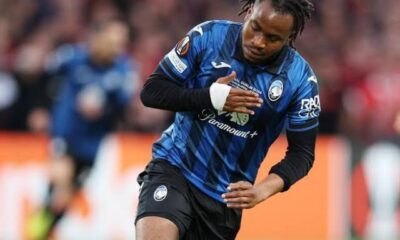

CAF celebrates Ademola Lookman’s AFCON goals ahead of AFY award
-
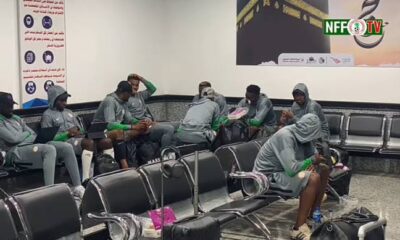

Reports say Libyan authorities have begun mass arrest of Nigerians following CAF verdict
-
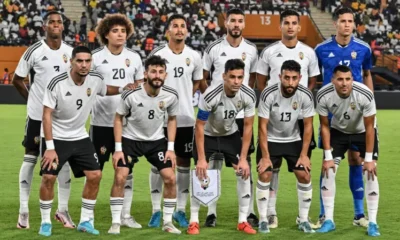

Libya vows to appeal CAF’s sanctions over botched Afcon match with Nigeria
-
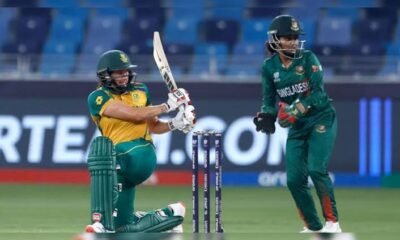

South Africa succumbs to New Zealand in T20 World Cup final
-
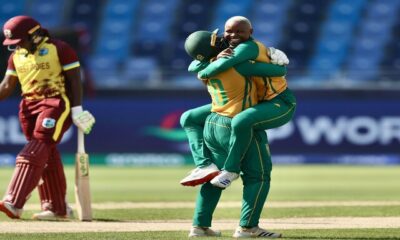

Cricket: South African women thrash West Indies by 10 wickets in T20 World Cup
-
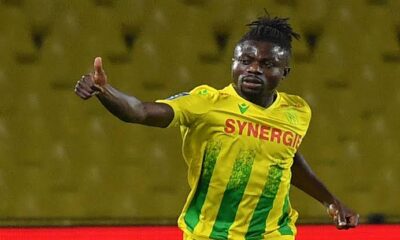

Ligue 1 honours Moses Simon on making 150 appearances for Nantes
Strictly Personal
Budgets, budgeting and budget financing, By Sheriffdeen A. Tella, Ph.D.
Published
2 days agoon
November 20, 2024
The budget season is here again. It is an institutional and desirable annual ritual. Revenue collection and spending at the federal, State and local government levels must be authorised and guided by law. That is what budget is all about. A document containing the estimates of projected revenues from identified sources and the proposed expenditure for different sectors in the appropriate level of government. The last two weeks have seen the delivery of budget drafts to various Houses of Assembly and the promise that the federal government would present its draft budget to the National Assembly.
Do people still look forward to the budget presentation and the contents therein? I am not sure. Citizens have realised that these days, governments often spend money without reference to the approved budget. A governor can just wake up and direct that a police station be built in a location. With no allocation in the budget, the station will be completed in three months. The President can direct from his bathroom that 72 trailers of maize be distributed to the 36 states as palliatives. No budget provision, and no discussion by relevant committee or group.
We still operate with the military mentality. We operated too long under the military and of the five Presidents we have in this democracy, two of them were retired military Heads of State. Between them, they spent 16 years of 25 years of democratic governance. Hopefully, we are done with them physically but not mentally. Most present governors grew up largely under military regimes with the command system. That is why some see themselves as emperor and act accordingly. Their direct staff and commissioners are “Yes” men and women. There is need for disorientation.
The importance of budget in the art of governance cannot be overemphasized. It is one of the major functions of the legislature because without the consideration and authorisation of spending of funds by this arm of government, the executive has no power to start spending money. There is what we refer to as a budget cycle or stages. The budget drafting stage within the purview of the executive arm is the first stage and, followed by the authorisation stage where the legislature discusses, evaluates and tinkers with the draft for approval before presenting it to the President for his signature.
Thereafter, the budget enters the execution phase or cycle where programmes and projects are executed by the executive arm with the legislature carrying out oversight functions. Finally, we enter the auditing phase when the federal and State Auditors verify and report on the execution of the budgets. The report would normally be submitted to the Legislature. Many Auditor Generals have fallen victim at this stage for daring to query the executives on some aspects of the execution in their reports.
A new budget should contain the objectives and achievements of the preceding budget in the introduction as the foundation for the budget. More appropriately, a current budget derives its strength from a medium-term framework which also derives its strength from a national Development Plan or a State Plan. An approved National Plan does not exist currently, although the Plan launched by the Muhammadu Buhari administration is in the cooler. President Tinubu, who is acclaimed to be the architect of the Lagos State long-term Plan seems curiously, disillusioned with a national Plan.
Some States like Oyo and Kaduna, have long-term Plans that serve as the source of their annual budgets. Economists and policymakers see development plans as instruments of salvation for developing countries. Mike Obadan, the former Director General of the moribund Nigeria Centre for Economic and Management Administration, opined that a Plan in a developing country serves as an instrument to eradicate poverty, achieve high rates of economic growth and promote economic and social development.
The Nigerian development plans were on course until the adoption of the World Bank/IMF-inspired Structural Adjustment Programme in 1986 when the country and others that adopted the programme were forced to abandon such plan for short-term stabilisation policies in the name of a rolling plan. We have been rolling in the mud since that time. One is not surprised that the Tinubu administration is not looking at the Buhari Development Plan since the government is World Bank/IMF compliant. It was in the news last week that our President is an American asset and by extension, Nigeria’s policies must be defined by America which controls the Bretton Woods institutions.
A national Plan allows the citizens to monitor quantitatively, the projects and programmes being executed or to be executed by the government through the budgeting procedure. It is part of the definitive measures of transparency and accountability which most Nigerian governments do not cherish. So, you cannot pin your government down to anything.
Budgets these days hardly contain budget performance in terms of revenue, expenditure and other achievements like several schools, hospitals, small-scale enterprises, etc, that the government got involved in successfully and partially. These are the foundation for a new budget like items brought forward in accounting documents. The new budget should state the new reforms or transformations that would be taking place. Reforms like shifting from dominance of recurrent expenditure to capital expenditure; moving from the provision of basic needs programmes to industrialisation, and from reliance on foreign loans to dependence on domestic fund mobilisation for executing the budget.
That brings us to the issue of budget deficit and borrowing. When an economy is in recession, expansionary fiscal policy is recommended. That is, the government will need to spend more than it receives to pump prime the economy. If this is taken, Nigeria has always had a deficit budget, implying that we are always in economic recession. The fact is that even when we had a surplus in our balance of payment that made it possible to pay off our debts, we still had a deficit budget. We are so used to borrowing at the national level that stopping it will look like the collapse of the Nigerian state. The States have also followed the trend. Ordinarily, since States are largely dependent on the federal government for funds, they should promote balanced budget.
The States are like a schoolboy who depends on his parents for school fees and feeding allowance but goes about borrowing from classmates. Definitely, it is the parents that will surely pay the debt. The debt forgiveness mentality plays a major role in the process. Having enjoyed debt forgiveness in the past, the federal government is always in the credit market and does not caution the State governments in participating in the market. Our Presidents don’t feel ashamed when they are begging for debt forgiveness in international forum where issues on global development are being discussed. Not less than twice I have watched the countenance of some Presidents, even from Africa, while they looked at our president with disdain when issues of debt forgiveness for African countries was raised.
In most cases, the government, both at the federal and state cannot show the product of loans, except those lent by institutions like the World Bank or African Development Bank for specific projects which are monitored by the lending institutions. In other cases, the loans are stolen and transferred abroad while we are paying the loans. In some other cases, the loans are diverted to projects other than what the proposal stated. There was a case of loans obtained based on establishing an international car park in the border of the State but diverted to finance the election of a politician in the State. The politician eventually lost the election but the citizens of the State have to be taxed to pay the loan. Somebody as “Nigeria we hail thee”.
Transformation in budgeting should commence subsequently at the State and federal level. Now that local government will enjoy some financial autonomy and therefore budgeting process, they should be legally barred from contracting foreign loans. They have no business participating in the market. They should promote balanced budget where proposed expenditures must equal the expected revenues from federal and internal sources. The State government that cannot mobilise, from records, up to 40 percent of its total budget from IGR should not be supported to contract foreign loans. The States should engage in a balanced budget. The federal government budget should shift away from huge allocations to recurrent expenditure towards capital expenditure for capital formation and within the context of a welfarist state.
Sheriffdeen A. Tella, Ph.D.
Strictly Personal
African Union must ensure Sudan civilians are protected, By Joyce Banda
Published
4 weeks agoon
October 25, 2024
The war in Sudan presents the world – and Africa – with a test. This far, we have scored miserably. The international community has failed the people of Sudan. Collectively, we have chosen to systematically ignore and sacrifice the Sudanese people’s suffering in preference of our interests.
For 18 months, the Rapid Support Forces (RSF) and the Sudanese Armed Forces (SAF) have fought a pitiless conflict that has killed thousands, displaced millions, and triggered the world’s largest hunger crisis.
Crimes against humanity and war crimes have been committed by both parties to the conflict. Sexual and gender-based violence are at epidemic levels. The RSF has perpetrated a wave of ethnically motivated violence in Darfur. Starvation has been used as a weapon of war: The SAF has carried out airstrikes that deliberately target civilians and civilian infrastructure.
The plight of children is of deep concern to me. They have been killed, maimed, and forced to serve as soldiers. More than 14 million have been displaced, the world’s largest displacement of children. Millions more haven’t gone to school since the fighting broke out. Girls are at the highest risk of child marriage and gender-based violence. We are looking at a child protection crisis of frightful proportions.
In many of my international engagements, the women of Sudan have raised their concerns about the world’s non-commitment to bring about peace in Sudan.
I write with a simple message. We cannot delay any longer. The suffering cannot be allowed to continue or to become a secondary concern to the frustrating search for a political solution between the belligerents. The international community must come together and adopt urgent measures to protect Sudanese civilians.
Last month, the UN’s Independent International Fact-Finding Mission for Sudan released a report that described a horrific range of crimes committed by the RSF and SAF. The report makes for chilling reading. The UN investigators concluded that the gravity of its findings required a concerted plan to safeguard the lives of Sudanese people in the line of fire.
“Given the failure of the warring parties to spare civilians, an independent and impartial force with a mandate to safeguard civilians must be deployed without delay,” said Mohamed Chande Othman, chair of the Fact-Finding Mission and former Chief Justice of Tanzania.
We must respond to this call with urgency.
A special responsibility resides with the African Union, in particular the AU Commission, which received a request on June 21 from the AU Peace and Security Council (PSC) “to investigate and make recommendations to the PSC on practical measures to be undertaken for the protection of civilians.”
So far, we have heard nothing.
The time is now for the AU to act boldly and swiftly, even in the absence of a ceasefire, to advance robust civilian protection measures.
A physical protective presence, even one with a limited mandate, must be proposed, in line with the recommendation of the UN Fact-Finding Mission. The AU should press the parties to the conflict, particularly the Sudanese government, to invite the protective mission to enter Sudan to do its work free from interference.
The AU can recommend that the protection mission adopt targeted strategies operations, demarcated safe zones, and humanitarian corridors – to protect civilians and ensure safe, unhindered, and adequate access to humanitarian aid.
The protection mission mandate can include data gathering, monitoring, and early warning systems. It can play a role in ending the telecom blackout that has been a troubling feature of the war. The mission can support community-led efforts for self-protection, working closely with Sudan’s inspiring mutual-aid network of Emergency Response Rooms. It can engage and support localised peace efforts, contributing to community-level ceasefire and peacebuilding work.
I do not pretend that establishing a protection mission in Sudan will be easy. But the scale of Sudan’s crisis, the intransigence of the warring parties, and the clear and consistent demands from Sudanese civilians and civil society demand that we take action.
Many will be dismissive. It is true that numerous bureaucratic, institutional, and political obstacles stand in our way. But we must not be deterred.
Will we stand by as Sudan suffers mass atrocities, disease, famine, rape, mass displacement, and societal disintegration? Will we watch as the crisis in Africa’s third largest country spills outside of its borders and sets back the entire region?
Africa and the world have been given a test. I pray that we pass it.
Dr Joyce Banda is a former president of the Republic of Malawi.
EDITOR’S PICK


Ghana partners with The Gambia to provide free roaming services
Ghana and The Gambia are in the process of launching free roaming services that will enhance a West African connectivity....


Zambia: APP leader lampoons PF over pledge to reverse forfeited properties
Leader of one of Zambia’s opposition parties, Advocates for People’s Prosperity (APP), Mwenye Musenge, has criticised the Patriotic Front (PF)...


Ghanaian winger Fatawu out for season with ACL injury
Ghana and Leicester City winger, Abdul Fatawu, has been ruled out of the rest of the EPL season after suffering...


DRC authorities arrest six over break-in at Lumumba’s Mausoleum
Police in the Democratic Republic of Congo (DRC) say six people have been arrested over a break-in and vandalism at...


Finnish court imprisons Nigeria’s Simon Ekpa for aiding terrorism
Simon Ekpa, a Nigerian separatist leader based abroad, has been placed under detention by the Päijät Häme District Court...


Nigerian Senate confirms influx of terrorists from Mali, Burkina Faso into the country
The Nigerian Senate has raised the alarm over the influx of terrorists from Mali and Burkina Faso who operate in...


Tanzania to host 6th Ocean Innovation Africa summit in February
Dar es Salaam, Tanzania, has been selected to host the sixth edition of the Ocean Innovation Africa (OIA) summit from...


Miss SA opens up on why she withdrew from Miss Universe pageant
Reigning Miss South Africa 2024, Mia le Roux, has opened up on the reasons behind her withdrawal from the Miss...


SA football legend Lucas ‘Masterpieces’ Moripe passes away
South African football legend, Lucas “Masterpieces” Moripe, has passed away at the age of 71 after a long battle with...


Wanted Zambian MP who escaped from prison custody captured in Harare
A fugitive Zambian Member of Parliament (MP), Emmanuel Banda, who escaped from custody at the Chipata Prison in Eastern Province...
Trending
-

 Metro2 days ago
Metro2 days agoWanted Zambian MP who escaped from prison custody captured in Harare
-

 Sports2 days ago
Sports2 days agoSA football legend Lucas ‘Masterpieces’ Moripe passes away
-

 Culture2 days ago
Culture2 days agoMiss SA opens up on why she withdrew from Miss Universe pageant
-

 VenturesNow2 days ago
VenturesNow2 days agoKenya seeks $750m from World Bank, obtains $200m from AfDB— Official


